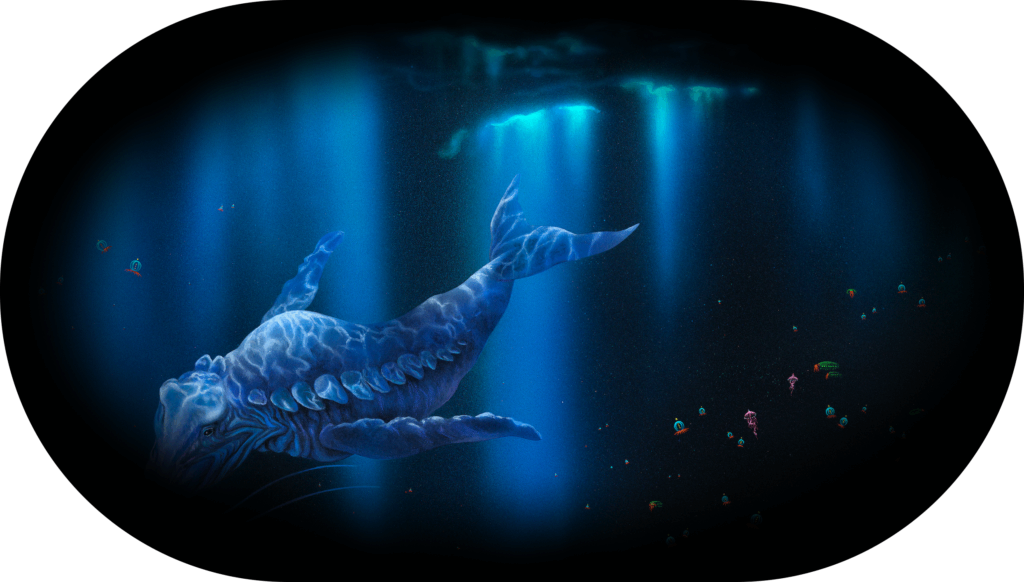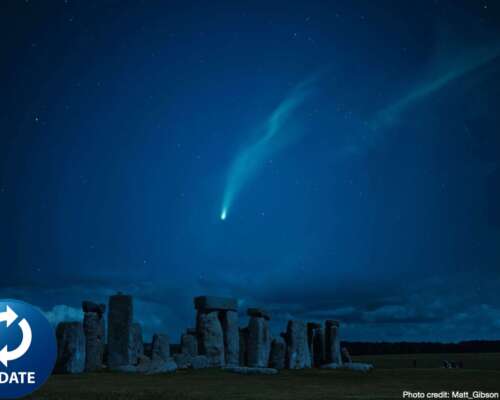The Fermi Paradox is a discussion of why, if our universe teems with life, have we not discovered it yet? Or, why have the ET’s have not discovered us. According to legend, a group of scientists (including Entico Fermi, a noted physicist from Italy), were sitting around a table some seventy years ago, just chitter chatting about science or the weather or the war and what not. Someone broached the subject of extraterrestrial life, and the statistical probability that many civilizations exist elsewhere in the universe, to which Fermi replied “So, where is everybody?”
Merriam Webster defines a paradox as “a statement that is seemingly contradictory or opposed to common sense and yet is perhaps true.” In other words, how can you live in a country like the U.S. with a population of 340,000,000 and never see a single person? Yet, depending on where you live, it is hypothetically possible.
There are many different answers that have been developed to answer this paradox. I’d like to just mention a few of them.
THE ALIENS WERE HERE, BUT THEY WENT HOME
Harvard University astronomer Avi Loeb believes that the Earth was visited by extraterrestials in ancient times and that they undoubtedly left odds and ends of their advanced technology scattered about. It’s just a matter of time before one is uncovered. One these artifacts are found, it will answer the question of whether we are alone in the universe, though it may not reveal much more than that.
WE ARE THE ALIENS
This proposition states that we are the descendants of aliens who originated elsewhere. This is based on a theory developed in ancient Greece (in the fifth century B.C.) known as “panspermia.” According to this hypothesis, the seeds of life (sperm) were broadcast throughout the galaxy by the leading life form and some of these seeds found their way to Earth, either by chance via asteroids or comets, space dust or deliberately by some probed launched to our planet. Once here, they took root and life evolved.

OUR PLANET IS A ZOO/EARTH HAS BEEN QUARANTINED
This is the notion that the aliens are sort of zookeepers and the Earth, itself, is a zoo. We cannot see our keepers, but they preserve life on this planet, much as our own zookeepers on Earth preserve habitats in minature. And often, the less this wildlife sees of us and the less we interact with it, the better it is for both. Another line of thinking is that other intergalactic civilizations have been warned to keep away from Earth, either for our benefit or because we might spread disease (or dangerous thinking) to them.
THE EXTRATERRESTRIALS ARE OUT THERE.
WE JUST NEED TO BE PATIENT

There are several variations to this notion. The first speaks to the vastness of space. Even traveling at the speed of light, it would take more than four years to get to the closest star (Proxima Centauri.). It would take more than 25,000 years to reach Earth from the closest galaxy to our planet. There may be ways to shorten this interval, such as by “folding space” or darting through wormholes, but we don’t have the power to fold space (even if it could be done) and we know of no wormholes (even if they exist.). Of course, any ET’s might come through the door of another dimension, so that might be a more convenient way for extraterrestials to visit Earth. In that sense, they may live on Earth with us and we just can’t perceive them.
LEARNING TO LISTEN

Some scientists wonder whether an alien race might be trying to contact us already, via radio signal, microbursts of radiation or some other way, but we just not aware of it. For example, a simple message like “Hello” which takes us only a fraction of a second to pronounce might take another civilization years to repeat the same word. Or, maybe they can do so thousands of times faster then we can communicate it. Either way, it would likely not register with us.
Nor have we eavesdropped long enough. We’ve only had the ability to listen in some crude way for less than a century, and then only a very small area of the sky; for a few days at a time. Searches are usually aimed at what are called “watering holes,” or frequencies on the radio band where civilizations might meet, just as animals do at an actual watering hole on Earth. These places where alien life supposedly “hangs out” are between 1420 and 1662 Megahertz. The number 1420 is the frequency of hydrogen, the most abundant element in the universe. Frequency 1420 is a dedicated (reserved) frequency for the purpose of searching for alien life and no nation on Earth may use it.
It may also be that the messages are mathematical or encrypted in ways we cannot understand without a primer. Perhaps we must pass an intelligence test as a (human) race before we are considered worthy of another civilization’s time?
A less popular idea but one that is gaining speed thanks to the Three Body Problem fiction series on Netflix and because of the original novels on which the series is based (including one called “The Dark Forest“), is that it is dangerous for other civilizations to reveal their presence trying to contact us. There may be space pirates or killer robots on the loose that might pick up on their signal and attack their planet. Or ours, if we aren’t careful as well.
THE “WHO CARES” SCENARIO
This iteration suggests that other civilization in space know about us, but aren’t interested in the least to get to know us. We’ve probably all found some person interesting in some way to us but who has absolutely no interest in making our acquaintance. Occasionally, people who live in our neighborhood can be that way, too. And who among us hasn’t been suspicious of a stranger’s motives if they appear too friendly to us? Aliens may share similar feelings. What can we possibly teach an advanced civilization? And why should they even take an interest in us.
THE EARTH IS THE ONLY INHABITED PLANET IN OUR GALAXY
This is a more logical conclusion than it might seem. Several thousand exoplanets have been discovered already, but none has life as far as we can tell. Some are hot enough to melt lead, others approach absolute zero (-273 degrees F.) Some are rogue planets without a start to call their own. Other planets do not have atmospheres, because they are too small, perhaps. And many of those planets that do have atmospheres have noxious gasses such as ammonia in them. Some exoplanets (but not many) seem to be terrestrial planets, but with uninviting moonscapes on their surface, seemingly barren even of water.
Earth has been called the privileged planet. We have water, O2 for animals and CO2 for plants. There is a moon that provides tides, and tectonic plates under the surface which are also necessary for life to emerge. Earth has a magnetosphere to shield us from cosmic rays and other forms of deadly radiation. Our planet is tilted at its axis to provide seasons, and the days and nights are “just right” for photosynthesis and other life functions (imagine a planet where night lasts for two months or two years! How can vegetation survive that? So it is perfectly reasonable to wonder if we are alone. Astronomers have trouble containing there enthusiasm often times and you hear tham say they have “proof” of life elsewhere in the galaxy, but that is simply not so. There, indeed, may be “earth-like” planets, or organic molecules, or gasses such as phosphine.
ALIEN LIFE MAY EXIST BUT IT MAY NOT
BE TECHNOLOGICALLY SOPHISTICATED
Think of all the lifeforms on Earth: Think of the species of fish, echinoderms and mollusks in the oceans, such as starfish, jellyfish and crabs. Think of the ten thousand species of birds, such as sparrows and cranes. Or insects such as butterflies, beetles and moths. Think of amphibians, reptiles and mammals. How many of them are capable of developing synthetic metals and constructing starships? Or, planning courses from point to point across the heavens? Only man. So, it is possible that life, even intelligent life exists elsewhere, but it does not have the ability to communicate over great distances or to construct vessels to sail the stars. The creatures shown below live in caves near lava pits on some moon deep in space circling a planet not yet discovered. They move about freely (though never far from their source of heat) They form family units, possibly even defend themselves collectively. But can they escape the gravitational bonds of their moon and live in the cold void of space?

ALIEN LIFE MAY BE HIDDEN FROM OUR VIEW AND SENSORS
If you ask exobiologists where in our solar system they might expect to find life, they might not state the obvious choices such as Venus and Mars. In fact, the might not even choose a planet at all, but rather a main, like Europa oceans forty to a hundred miles or more deep, or Enceladus. Titan might be another possibility. These moons generally have thick ice crusts, so at the moment it is impossible to tell what might–or might not–lurk there.

THE IMPORTANCE OF RESOURCES
If all we had on Earth were rocks, soil, plants and animals with no minerals, iron ore deposits, uranium, lithium and other ores and minerals, how could we build crafts that could escape our planet? There might be an abundance of raw materias on Mars, but how could we get there to mine it if we can’t find enough on our planet to send a freighter with a crew to exploit it? All we could to in that case is care for cattle and sheep and live in sod huts.
CIVILIZATION-ENDING CATASTROPHES
Now this is something we all should be able to relate to. At some point, a civilization may accidentially or deliberately destroy itself. It could be accidentially in the sense that some genetically-engineered, lethal virus gets loose and there is no cure for it. It could be deliberate destruction in the sense of thermonuclear war.
These are just some of the possible solutions to the Fermi paradox. Who knows if we will ever discover the truth of the matter?




